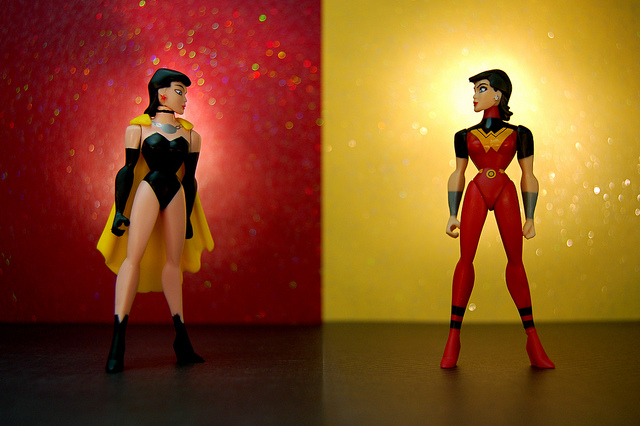It is safe to say that elementary school and high school were not my golden years.
I was a skinny, nerdy introvert who preferred books to sports. I also had an eagerness for belonging and popularity.
I was regularly picked last for teams in gym class, and my nickname was Mosquito Legs all the way through elementary school. Then came junior high school, and with it, all the social dynamics among girls that I had no idea how to navigate.
Because of my past experience, I was intrigued to stumble across a compelling TED talk given last year by media director Nicole Sorochan called, “How Exploring the Feminine Turned My Wounds into Strengths.” In it, she recounts a bullying incident from her adolescence that evoked some painful memories of my own:
“There was this alleyway where all the cool kids would hang out. One day, I decided to go and meet my best friend there. Something was different. As I walked up to her, she had a cigarette in her hand… She blew smoke in my face, all the girls around me laughing, spitting at me, and calling me names. This moment was significant, because we had made a friendship pact earlier this year that we would never smoke. We had been painfully watching her father die of lung cancer.
This was the first moment of weeks and weeks of girls harassing me; girls I had known my entire life. It was a game of Girl Roulette, and I was the girl of the week. It happened to most of us, as we got picked off, one by one. This was one of the first scars which hardened me to my relationships to women. I changed schools, but the girls were still the same. So I did what anyone would do: I quit girl relationships.”
The story was all-too-familiar: the targeted scapegoating, the shifting alliances, the ostracism, and the ridiculing. In response, I would often turn my aggression on younger girls, somehow hoping to settle some internal score. But dominating others felt neither reassuring nor empowering. I was losing on both sides of the equation.
Nicole goes on to describe a transition to adulthood increasingly drawn to the company of men, both socially and professionally:
“In a crowd full of men, I could be myself. I was witty, easygoing, happy. But put one more woman in the room, and whoa—everything was different. I would rarely say a word. Not because I didn’t want to, but because the room now contained a climate of competition. And I was part of that, whether I liked it or not.”
Here too, I heard my own story in her words: Going into adulthood, I often found myself in the presence of men. Hanging out with them seemed less complicated, more fun. So what? I loved men and knew many wonderful guys (and still do). But this preference also kept me blind to another side that surfaced only around other women: one that was judgmental, hyper-vigilant and competitive. To this day, women-only social environments simultaneously awaken a hunger to please alongside a desire to compete and dominate. And like Nicole Sorochan, I knew that not facing this part of me was affecting every other area of my life.
Her TED talk has a powerful ending, as she goes on to describe a journey that led her to direct Amplify Her, a documentary about female DJs in the electronic music industry. The film was part of a collaborative project with music producers working alongside other female artists. Using graphic illustration, animation and music, these women told their Heroine’s journeys of old wounds being transmuted into powerful and creative expressions of the feminine. This collaboration was itself a transformative experience that allowed these talented artists—most of whom also worked in mainly male environments—to heal and discover new dimensions of feminine power in community.
This story is an inspiring example of how women are coming together all over the world to celebrate the rise of the goddess, and support each other as entrepreneurs, healers, artists, and leaders. Along the way, a mantra of sorts is emerging: “We have to stop competing and start standing with, and for, each other,” often met with applause and cheers.
But is it really that simple? What about those hidden barriers to true authentic relating among women? While we all know how destructive masculine power can be, as Nicole’s stories—along with mine and many others—show, feminine power has its shadow as well. Worse, it can be harder to spot, often showing up in more subtle and toxic ways via psychological manipulation, passive aggression, and gossip.
Many can relate to having conflicting feelings around other women. Maybe there is a guilty hint of satisfaction upon hearing about a sister’s minor (or epic) failures, about the breakup from that dream relationship, or losing the dream job. How many of us, amidst a growing body image movement, still find ourselves judging our own—and each other’s—hips and thighs? How many of us have judged another woman for being too beautiful, too thin, too fat, too sexual, too bubbly, too bold, or for taking up too much space? These feelings visit me more than I care to admit.
Which makes perfect sense, according to psychologist Noam Schpancer, author of the Psychology Today article “Feminine Foes: New Science Explores Female Competition.” He writes: “The tendency to engage in [female] competition appears to be a part of our genetic hardware,” and a “feature in the heritage of human culture.” Our ancient ancestors were hardwired to select the type of mates that would ensure survival for her and her litter from the various threats of prehistoric life: predators, hostile rival tribes and the elements. Overt physical conflict between women was rare, given their roles. So conflict went underground, unlike their brothers who were perfectly fine to slug it out in the afternoon and break bread together that evening.
Adapting to an increasingly complex world where men held overt power, women would instead use their influence through other means, such as their sexuality, or their more powerful mates: the clan leaders, emperors, or CEOs. Associations with men would improve their life conditions, raise their status and offer more opportunities, such as jobs. So it was easy to see other women as competition for assets that were harder for them to access directly. As Schpancer writes, “as women come to consider being prized by men as their ultimate source of strength, worth, achievement and identity, they are compelled to battle other women for the prize.”
Meanwhile today, as increasingly airbrushed breasts and a*ses still continue to dominate our media, many of us find ourselves jealously eyeing each other alongside internal running commentaries, while on the surface playing the “nice role” perfected from childhood.
As complex, evolving beings, we are much more than our hardwiring. But by reminding ourselves that many millennia went into shaping biology and culture, we can be more forgiving of ourselves in our less elevated moments. Even better, we can begin to see the evolutionary or adaptive intelligence to these tendencies. Which can help us to appreciate how our mothers and grandmothers made less-than-progressive choices that made sense in their worlds.
So when we succumb to a catty moment or two, maybe we can cut ourselves a little slack and remember that the feelings we are battling have ancient roots. The, “Let’s all drop the competition” slogan risks invoking shame on ourselves for our inconvenient truths that contradict our higher values. Calling women to a higher standard is important, but not by trampling over a tender part of ourselves in need of healing.
Women’s circles are a powerful way to create community, but often in these spaces, we don’t go beyond affirming and supporting each other. But what if we created safe spaces to engage more honestly with our inner voices, by speaking the raw truth of our experiences, however mundane, embarrassing, or confusing? What if we could look each other in the eye and dare to say: “I am jealous of you because you are younger and more beautiful than me.” Or, “I don’t want you to be successful, because it reminds me of the ways I feel like a failure.” Or, “I find it easier to empathize with your pain, than to celebrate your successes.” This could be a powerful starting point for letting go of the “nice” act with each other. And what if we stepped into our fire and challenged, even confronted other women, more openly and directly, in the service of discovery, catharsis and healing?
So absolutely, let’s drop the fearful and competitive behaviors. And yes, we need to start standing with, and for, each other. We need to really get how diminishing each other—even if in our own minds—stunts our own power and potential.
But let’s also be honest and forgiving about the gap between where we are, and where we want to be.
Our complexity and contradictions are beautiful, and we can create more space for those hidden—even taboo—voices, to come out and be seen. This is a true form of feminine power: Revealing all of who we are, the powerful, intelligent, sexy, courageous aspects of us, as well as the wounded and vulnerable parts. By offering ourselves up in this way, in transparency and trust, we may begin to create a new narrative for our collective journey as evolving women.
~
˜
Author: Amanda Suutari
Image: Flickr/JD Hancock
Editors: Travis May; Caitlin Oriel







Read 1 comment and reply